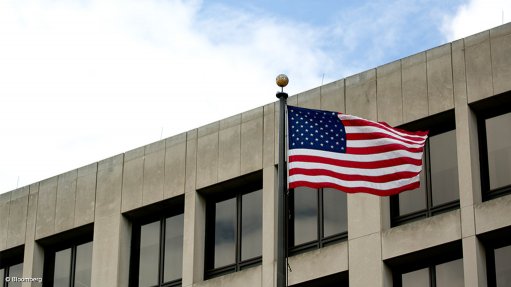
Photo by: Bloomberg
In the wake of concerns and uncertainties surrounding South Africa’s future US trade structure since billionaire businessperson and US President-elect Donald Trump won what was described as the most personality-driven political election in US history, US Ambassador to South Africa Patrick Gaspard assured South Africans that the country remained as important to the US as ever.
Addressing delegates at a Gordon Institute of Business Science gathering, in Johannesburg, on Tuesday, the outgoing Ambassador said he was optimistic that South Africa would continue to be viewed as a “friend and partner” post-election, pointing out that it was also improbable that one of the key trade agreements linking the two economies would be revoked.
“To put it simply, South Africa matters. It matters to the continent and to the world,” he assured, pointing to numerous cooperation efforts and initiatives spanning several key markets or industries.
Trade between the US and South Africa totals about $21-billion, or R300-billion, a year in goods and services, with the US sourcing, in particular, vehicles, agroprocessed litchis and high-quality wines from South Africa.
“Trade and services is also absolutely vibrant in tourism, in education, in technology. Services are the bedrock of both of our economies and our trade and services are only going to grow stronger.”
However, as new paths of trade have been forged between the two economies – in particular, the turbulent, drawn-out renewal of the landmark ten-year African Growth and Opportunity Act (Agoa) agreement – Gaspard noted that not enough time had been spent on the “critical and vital space” that South Africa filled in the region's economy and concerning its peace and security.
As South Africa, which boasts a population of 55-million, accounts for 5.5% of the continent’s population, contributes $360-billion economically and accounts for 13%, or $7-billion, of Africa’s yearly $55-billion foreign direct investment, progress across the continent is for the most part reliant on the progress of South Africa.
“Simply put, Africa cannot succeed without South Africa. That is not to say that South Africa’s success will guarantee Africa’s prosperity, but it certainly seems to be a necessary condition,” he said.
The robust US–South Africa trade relationship is founded on a strong bilateral investment partnership, with South Africa considered the doorway to the rest of the continent and opening opportunities for goods and services to flow into the African market.
Agoa remains an essential element of the trade relationship and it was improbable that the agreement could be set aside, said Gaspard, even if Trump considers doing so, as the agreement was agreed by the US Congress and any amendments or decisions regarding Agoa would be subject to a review process and approval by Congress.
“No President can sign into law anything related to Agoa,” Gaspard assured, adding that work was under way to add new products to South Africa’s export basket, as well as new producers of products.
South Africa has, to date, “made the best possible use” of the tariff lines under Agoa, exporting a variety of manufactured goods and high-value agricultural products to the US.
Now there is a need for South Africa not to look at the new ten-year window of the agreement, but rather consider a five-year outlook and seek options post the expiration of the deal.
“If we do not do the hard work now over the course of the next three, four, five years to design what the off-ramp will look like for Agoa, then we will have disadvantaged both of our markets,” he said, noting that ten years will pass rapidly.
The US and South Africa both believed there was a need for a “mature, balanced and mutually beneficial” trade relationship, said Gaspard, citing the positive direction of recent discussions with South Africa’s Department of Trade and Industry.
“We are engaged with the South African government and private sector to define what our investment relationship will become after Agoa expires as we work together to create prosperity in our markets.”
In the short term, Gaspard proposed a “series” of smaller agreements highlighting sectors of cooperation and outlining reasonable, achievable goals for “moving forward together”.
“These smaller agreements would focus on a range of topics important to both sides, interests like protecting and using intellectual property, protecting labour rights, trade facilitation, bilateral investment issues and fostering trade in services.
“In my mind, we would work on each agreement separately figuring out the best ways to collaborate and address concerns to make those agreements absolutely transparent and mutually beneficial and, while separate, these agreements would all be building towards the ultimate goal in our partnership.”
In addition, the US and South Africa partner and collaborate on several initiatives, including support response for the crippling drought in the Southern Africa region, the mitigation and adaptation to the potentially severe impacts of climate change, countering wildlife trafficking and responding to the HIV/Aids epidemic.